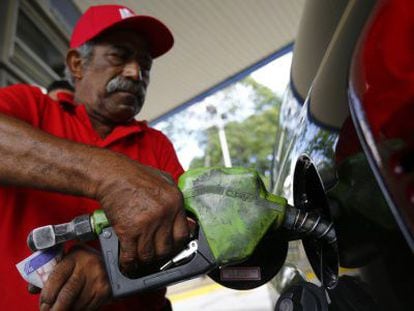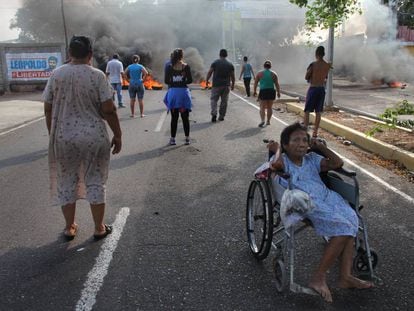Desperate times, desperate measures
The state of emergency in Venezuela reveals just how weak President Maduro’s position is

President Nicolás Maduro’s decision to declare a state of emergency suspending constitutional guarantees, a move that simultaneously gives him carte blanche to exercise authoritarian rule, is a serious violation of the rules of democracy. It pushes Venezuela to the brink of internal conflict, with unpredictable and possibly tragic consequences.
The use of the armed forces, which are to hold maneuvers on Saturday, is just the latest and worrying move by a leader who has fallen out of favor with the electorate, as evidenced by the legislative elections of December 6 that gave a major vote of confidence to the opposition. Maduro first refused to recognize the outcome, and then, at the insistence of the military, has since denied the legitimacy of the new, opposition-controlled National Assembly.
Maduro and his circle are not prepared to accept anything that challenges their power
The ridiculous excuse of the threat of outside military intervention in Venezuela to push through further authoritarian measures simply confirms the worst predictions about where the South American country is headed, but Maduro and his circle are not prepared to accept anything that challenges their power. Regardless of what Maduro says, nobody is about to invade Venezuela or declare “economic war” on it. Instead, the current situation is the result of disastrous economic policies that are converting a country rich in resources into a failed state now characterized by political repression and suicidal isolationism.
The difference between Maduro and the democratic opposition is that while the latter respects the law, the president uses it as it suits his interests. The opposition approved an amnesty on April 29 to free political prisoners (among them Leopoldo López, who has been held in solitary confinement for the last two years in a military prison). Maduro has used the Supreme Court, which answers to the ruling party, to stall the measure.
The opposition has since tried to use a mechanism created by deceased former president Hugo Chávez to improve transparency: a recall referendum. On May 2, the opposition handed in a petition to the electoral commission with nine times the number of signatures required to convene a recall election to decide if Maduro should stand down. But the state of emergency decreed by the president now puts that in doubt.
Rather than listening to the calls from within and without the country to begin a serious dialogue with the opposition to facilitate a democratic transition, Maduro has instead opted to dig in and ignore the poverty that the majority of Venezuelans are trying to survive. The opposition must now resist falling into the trap of a confrontation with a regime that has shown itself prepared to take increasingly desperate measures to hold on to power.
English version by Nick Lyne.
Sign up for our newsletter
EL PAÍS English Edition is launching a weekly newsletter. Sign up today to receive a selection of our best stories in your inbox every Saturday morning. For full details about how to subscribe, click here.
More information












































